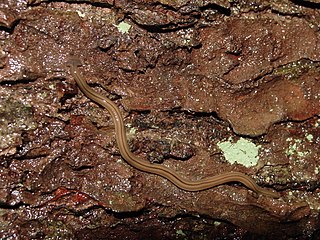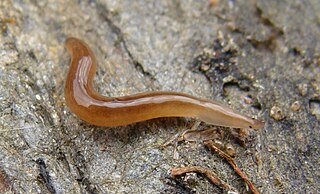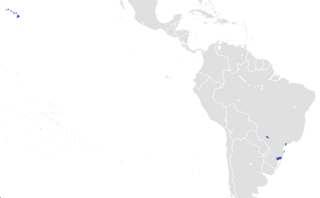
The New Zealand flatworm is a large land flatworm native to New Zealand. It can vary from 5 mm in length when hatched to approximately 17 centimetres (6.7 in) in mature adults.

Geoplanidae is a family of flatworms known commonly as land planarians or land flatworms.

Bipalium is a genus of large predatory land planarians. They are often loosely called "hammerhead worms" or "broadhead planarians" because of the distinctive shape of their head region. Land planarians are unique in that they possess a "creeping sole", a highly ciliated region on the ventral epidermis that helps them to creep over the substrate. Several species are considered as invasive to the United States and to Europe. Some studies have begun the investigation of the evolutionary ecology of these invasive planarians.

Caenoplana coerulea, known as the blue planarian or blue garden flatworm is a species of land planarian.

Platydemus is a genus of large predatory land planarians in the tribe Rhynchodemini.

Bipalium kewense is a species of large predatory land planarian with a cosmopolitan distribution. It is sometimes referred to as a "hammerhead flatworm" due to its half-moon-shaped head, but this name is also used to refer to other species in the subfamily Bipaliinae.

Bipalium adventitium is a land planarian in the subfamily Bipaliinae. It has been accidentally introduced in the United States, where it is considered invasive.

The reproductive system of planarians is broadly similar among different families, although the associated structures can vary in complexity.

Bipaliinae is a subfamily of land planarians found mainly in Madagascar, the Indian subcontinent and Southeast Asia, although some species have been introduced worldwide.

Diversibipalium multilineatum is a species of large predatory land flatworm.

Rhynchodeminae is a subfamily of land planarians with a worldwide distribution.

Caenoplanini is a tribe of land planarians in the subfamily Rhynchodeminae mostly found throughout the Australasian and Oceanian realms.

Endeavouria is a monotypic genus of land planarians from the Pacific region. It contains a single species, Endeavouria septemlineata.
Eudóxia Maria Froehlich was a Brazilian zoologist.

Marionfyfea is a genus of land planarians from Antarctic Islands off New Zealand. However, a species has been described from specimens found in Europe, probably introduced.

Marionfyfea adventor is a species of land planarian described in 2016 from specimens found in the United Kingdom, the Netherlands and France. However, since the species belongs to the genus Marionfyfea, of which the species are known only from subantarctic islands off New Zealand, it is probably an introduced species in Europe.
Marionfyfea carnleyi is a species of land planarian from Sub-Antarctic Islands of New Zealand.
Anzoplana is a genus of land planarians from Australia, currently comprising a single species, Anzoplana trilineata.
Eudoxiatopoplana is a genus of land planarians from New Zealand, currently comprising a single species, Eudoxiatopoplana bilaticlavia, that occurs in Stewart Island. It is the sole genus of the subfamily Eudoxiatopoplaninae.
Marion Liddell Fyfe was a New Zealand academic, specialising in taxonomy of planarians and other flatworms, the first woman zoology lecturer at the University of Otago, and the first woman to be elected to the Council of the Royal Society Te Apārangi.













